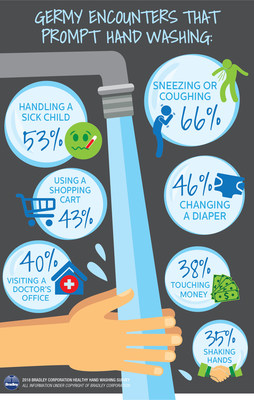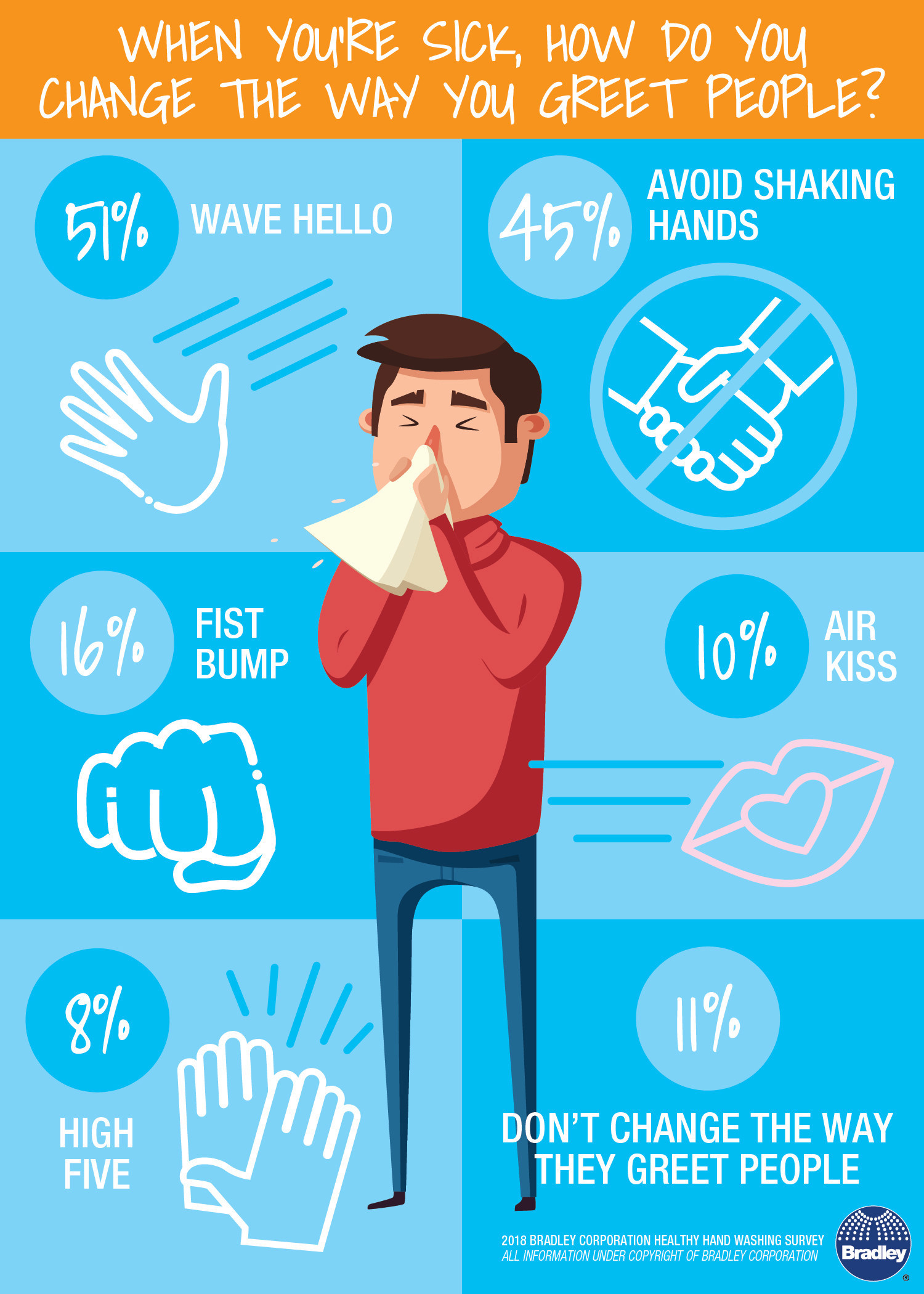by Brianna Crandall — February 19, 2018 — Businesses that make a point to clean up their restrooms may also clean up in sales and more return business, according to new national research conducted by commercial washroom and emergency safety products manufacturer Bradley Corporation. The survey also studied the effect of this year’s particularly vicious flu season on the frequency of hand washing.
Restrooms
The annual Healthy Hand Washing Survey reveals that almost half of Americans say they will “definitely” or “probably” spend more money at a business that has clean, well-maintained restrooms. In addition, nearly 60% of Americans make a conscious decision to visit a specific business because they know it has nice restrooms.

This year’s survey gave further confirmation of how consumers respond positively to clean restrooms. Photo courtesy Bradley
Jon Dommisse, director of strategy and corporate development for Bradley Corp., stated:
The inherent correlation between restroom conditions, businesses and customers extends even deeper than we realized. Our survey has previously highlighted how well-maintained restrooms increase patronage; learning that people also reward these businesses with their spending power was further confirmation of how consumers respond positively to clean restrooms.
The condition of restrooms can reflect positively or negatively on any business, including clients or potential business partners visiting an office building, but for restaurants, the judgment is especially tough, as 82% think a restaurant with dirty restrooms is “extremely” or “fairly” likely to have a dirty kitchen. Further, out of all types of facilities, restaurants and health care establishments cause Americans the most concern about workers not washing their hands.
Untidy restrooms send business down the drain
The survey also shows that when businesses let restroom maintenance slip through the cracks, they are at a high risk of jeopardizing customer satisfaction and sales.
Dommisse continued:
More than half of Americans say they are unlikely to return to a business after experiencing a poorly maintained restroom. Others will complain to management, tell a friend, or leave right away without completing their business.
That means more businesses may be on shaky ground with customers, since 70% of Americans report having an unpleasant restroom experience — a number that has steadily increased from 59% over the past three years. In fact, 42% said they had a bad experience within just the past two months.
When asked about the biggest “pain points” in restrooms, an overwhelming majority identified the following circumstances as “extremely” or “very” aggravating:
- 83%: Toilet clogged or not flushed
- 78%: Toilet paper dispenser empty or jammed
- 74%: Partition doors don’t latch
- 73%: Unpleasant smells
- 72%: Overall appearance is old, dirty or unkempt
Top restroom frustrations include having to walk across a wet floor (women in particular), reaching over someone to access soap, and waiting in line for a hand dryer.
Flu
The survey of 1,035 Americans, which was fielded January 2-5, also delved into perceptions about this year’s pervasive flu season. Almost 60% of Americans are “extremely” or “quite” concerned about contracting a new or particularly resilient strain of the flu.
Flu-conscious Americans increase hand washing
This elevated concern appears to prompt more diligent hand washing, which medical experts say is the best defense against sickness, as 65% of Americans say they wash their hands more frequently or more thoroughly to avoid getting germs or passing them on to others.
In addition to increased hand washing, the survey found Americans try to fend off colds and the flu by supporting their overall wellbeing. 53% increase their fluid intake, 47% take vitamin C or a preventative supplement and 40% try to get more sleep.
On the home front, nearly 80% escalate their cleaning and sanitizing of surfaces and linens, as commercial facilities cleaning professionals are also advised to do. According to Bradley, that’s a good practice, since Dr. McCann says cold and flu viruses can persist on solid surfaces like sinks, countertops, doorknobs and phones for about a day.
The survey also found that, while 56% stay home when they’re sick, those who are ill change the way they greet people. 51% wave hello. Others simply avoid shaking hands, and some utilize a fist bump or air kiss instead.
Hand washing in public restrooms declines
Unfortunately, when asked about their hand washing habits in public restrooms, just two-thirds of respondents say they “always” wash their hands after using a public restroom. Moreover, 38% report they “frequently” see others leave a public restroom without washing.
Dommisse emphasized that “hand washing is a must, especially this time of year,” to reduce the spread of illness.
For more information on Bradley’s 2018 Healthy Hand Washing Survey, visit the company’s Web site.






